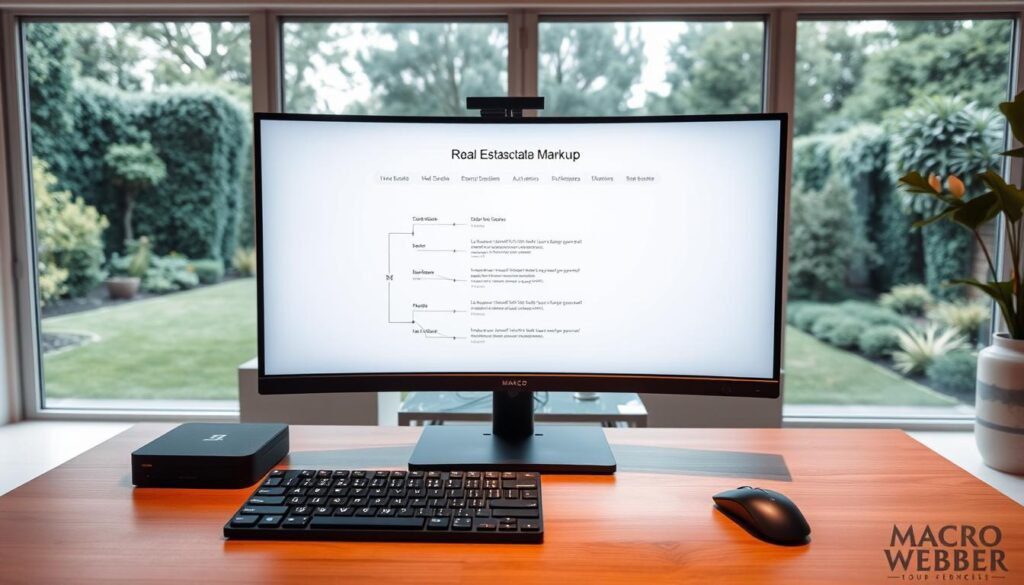Did you know 97% of homeowners start their property search online? With Google dominating 87.34% of search traffic, standing out in crowded markets requires smart digital strategies. If your listings aren’t optimized, you’re missing out on high-intent buyers.
Macro Webber specializes in helping professionals like you enhance visibility. Our data-driven approach ensures your properties appear where buyers search most—Google’s Local Pack and top organic results. The National Association of Realtors confirms online searches drive 90% of purchasing decisions, making optimization non-negotiable.
From GBP profiles to neighborhood-focused content, we tailor solutions for maximum impact. Ready to transform your digital presence? Visit Macro Webber or contact our team today.
Key Takeaways
- Nearly all homebuyers begin their search online.
- Google controls the majority of search traffic.
- Optimized listings increase visibility in high-demand areas.
- Local Pack rankings directly influence lead generation.
- Macro Webber offers customized strategies for competitive markets.
Why Local SEO Is Essential for Real Estate Agents
Gone are the days when billboards and cold calls drove real estate leads. Today, 51% of buyers find their agent through search engines, making digital visibility critical for your business.
The Shift From Traditional to Digital Client Acquisition
Decades ago, agents relied on yard signs and newspaper ads. Now, 89% of buyers and sellers start their journey online. Search engines like Google decide who gets noticed first.
Mobile searches for homes grew 200% year-over-year. If your listings aren’t optimized, you’re invisible to these ready-to-buy clients.
How Local Search Dominance Impacts Lead Generation
Google’s Local Pack—the map results above organic listings—drives *primary conversion traffic*. A top-3 ranking here captures 44% of clicks.
One agent boosted leads by 40% after optimizing their Google Business Profile. Their secret? Hyper-local keywords and updated listings for each neighborhood.
“Near me” searches for properties surged 230% last year. Clients want hyper-relevant results fast. Your market presence hinges on meeting this demand.
Local SEO Tips for Real Estate Agents in Competitive Markets
Buyers search with precision—your content must match their intent. Long-tail phrases like “luxury condos in [neighborhood]” convert 2.5x better than generic terms. Start by mapping queries to local demand.
Prioritizing Hyper-Local Keywords and Intent
Tools like Google Autocomplete and AnswerThePublic reveal how clients phrase searches. For example:
- Location-modifiers: “Downtown loft with parking” vs. “City homes”
- Community vernacular: Check forums for terms like “walkable” or “up-and-coming”
“Agents targeting ZIP code-level keywords see 40% more qualified leads.”
Leveraging Neighborhood-Specific Content
Create guides like “First-Time Buyer’s Guide to [ZIP Code]”. Highlight:
- School districts and transit routes
- Quarterly market reports (update annually)
- Testimonials from area residents
This SEO strategy builds trust and ranks for low-competition, high-intent phrases.
Conducting a Real Estate SEO Audit
53% of professional websites have technical flaws that hurt visibility—is yours one? Regular audits uncover hidden issues dragging down your search performance. Start with these two critical areas:
Assessing Site Structure and Technical Health
Google penalizes slow or broken pages. Run this checklist:
- Mobile responsiveness: 60% of searches happen on phones.
- Page speed: Aim for under 2 seconds—delays increase bounce rates by 32%.
- SSL certification: Secure sites rank higher and build trust.
Fix crawl errors in Google Search Console. Missing meta tags or broken links? They’re like locked doors to potential buyers.
Identifying High-Performing vs. Underperforming Pages
Analyze your website data to spot trends:
- Pages with high impressions but low clicks need better titles or meta descriptions.
- Update property archives monthly—expired listings harm rankings.
“Agents who audit their site quarterly see 27% more organic traffic.”
For large inventories, XML sitemaps ensure Google indexes all pages. Prioritize fixes where they’ll impact visibility most.
Mastering Keyword Research for Local Markets
Finding the right keywords can make or break your online visibility. Neighborhood-specific phrases like “homes for sale [neighborhood]” face 30% less competition than city-wide terms. This precision helps you attract ready-to-buy clients.

Tools to Uncover Long-Tail Real Estate Queries
Start with Google Keyword Planner and SEMrush. These tools reveal:
- Commercial intent phrases (e.g., “for sale by owner [area]”).
- Gaps in competitors’ strategies using Gap Analysis.
- Seasonal trends like “tax benefits home buying [location]” in Q4.
Balancing Search Volume and Competition
High search volume terms often face fierce rivalry. Instead, target:
- Pillar terms (“[City] Housing Market”) for content clusters.
- Low-competition phrases with buyer intent (e.g., “move-in ready [neighborhood] condo”).
“Agents focusing on ZIP code-level keywords see 40% more qualified leads.”
Reverse-engineer top-ranking competitors’ seo tactics. Update your strategy quarterly to align with shifting traffic patterns.
Optimizing Your Google Business Profile for Maximum Visibility
A well-optimized Google Business Profile can triple your visibility in local searches. Google prioritizes complete profiles with fresh content, making this your top tool for attracting buyers. Weekly updates boost engagement by 35%, according to recent data.
Claiming and Verifying Your Listing
Unverified profiles risk suspension. Follow these steps:
- Use a business email (not personal) for verification.
- Avoid PO boxes—Google requires a physical address.
- Post the verification code within 14 days.
Delays or mismatched details trigger flags. Double-check business profile data before submission.
Best Practices for Photos, Posts, and Descriptions
Clients engage most with visual content. Upload:
- 10+ professional images with EXIF location tags.
- Market updates every Tuesday (e.g., price trends).
- New listings every Friday to stay relevant.
“Agents with 20+ GBP photos get 42% more profile views.”
Managing Practitioner Listings for Teams
Multi-agent firms need structured profiles:
| Action | Result |
|---|---|
| Individual agent pages under main GBP | Avoids duplicate content penalties |
| Respond to reviews within 24 hours | Boosts local ranking signals by 15% |
Consistency is key. Sync your business profile with website data to reinforce seo efforts.
Building Local Citations and Backlinks
Zillow profiles generate 2.8x more leads than generic directories—are you leveraging them? Citations and backlinks act as trust signals, boosting your visibility in search results. Consistency across platforms is key to avoiding ranking penalties.
Top Directories for Real Estate
Focus on high-impact platforms first:
- Zillow and Realtor.com: Essential for syndicating listings.
- Local MLS and Chamber of Commerce: Strengthen community ties.
Missing profiles? Google prioritizes businesses with complete citations. Update contact details quarterly.
Strategies for Earning High-Authority Links
Quality backlinks outperform quantity. Try these tactics:
- Guest posts on regional blogs (e.g., parenting or relocation sites).
- Sponsor youth sports teams for .gov or .edu links.
- Publish market reports—local news outlets often share them.
“Agents with 10+ niche backlinks see 50% higher domain authority.”
Tools like BrightLocal monitor citation consistency. Fix discrepancies within 48 hours to maintain rankings.
Creating Location-Specific Landing Pages
Neighborhood-focused landing pages outperform generic city pages by 68%—are you maximizing this advantage? Tailored content resonates with buyers seeking hyper-local insights. Start with a strategic foundation.
SEO-Friendly URL Structures
Clear hierarchies boost visibility in search results. Follow this format:
- /services/neighborhoods/[name]-real-estate (e.g., /services/neighborhoods/greenwood-real-estate)
- Avoid special characters or vague terms like “area1”.
| URL Example | Impact |
|---|---|
| /city/homes | Low relevance, high competition |
| /neighborhoods/greenwood-homes | 68% higher conversion rate |
Content That Converts
Pair market data with social proof. Embed interactive maps showing school districts and price filters. Highlight sold properties with before/after pricing to build trust.
“Video testimonials from recent clients increase time-on-page by 40%.”
Add schema markup for average price per sq ft. This enhances rich snippets in search results, like this:
- Market reports: Update quarterly with median prices.
- Testimonials: Feature quotes from families who moved recently.
Leveraging Schema Markup for Listings
Structured data gives your listings a competitive edge in search results. Properties using schema markup appear 30% more often in rich snippets according to recent studies. This technical enhancement makes your content stand out visually.

Technical Implementation Guide
Adding structured data works across platforms. For WordPress, plugins like Schema Pro automate the process. IDX sites often have built-in tools.
Essential properties to mark up include:
- Open house dates with timezone specifications
- Virtual tour availability (highlight 360° features)
- Price changes with timestamp data
| Platform | Implementation Method | Verification Tool |
|---|---|---|
| WordPress | Plugin configuration | Google Rich Results Test |
| IDX | Custom fields in CMS | Search Console |
Enhancing Search Appearance
Search engines use structured data to create detailed previews. A case study showed 22% higher CTR after implementing RealEstateListing schema.
Boost your knowledge panel by adding:
- Professional certifications (e.g., ABR, CRS)
- Award history with verification links
- Client satisfaction metrics
“Agents who fix schema errors within 48 hours maintain 95% rich snippet eligibility.”
Common mistakes include missing required fields or incorrect formatting. Use Google’s Data Highlighter tool for quick fixes.
Harnessing Reviews for Rankings and Trust
Client testimonials hold more power than you might realize—47% of businesses see better visibility with just five 5-star reviews. These digital word-of-mouth endorsements do double duty: boosting your search rankings while establishing credibility with potential buyers.
Ethical Ways to Boost Your Review Profile
Automation saves time without compromising authenticity. Transaction closing software can send review requests when clients are most satisfied—right after successful deals close.
Create simple video tutorials showing how to leave reviews on Zillow and Google. Many happy customers skip leaving feedback simply because the process seems confusing.
- Feature your profile links in email signatures
- Add QR codes to closing gift packages
- Schedule quarterly “review update” reminders
“Agents who systematize review requests gain 3x more testimonials annually.”
Transforming Criticism Into Opportunities
Negative feedback happens—how you respond defines your professionalism. For pricing complaints, use templated responses that acknowledge concerns while educating about market dynamics.
Always thank reviewers for their input, even when disputing claims. This shows potential clients you value all feedback. Take heated discussions offline promptly with a “Let’s connect directly to resolve this” approach.
Turn positive reviews into marketing gold by:
- Featuring them in social proof campaigns
- Adding them to neighborhood landing pages
- Creating “Client Stories” video series
Monitor 15+ platforms monthly. Sudden review spikes—positive or negative—often indicate operational issues needing attention. Consistent management builds lasting success.
Social Media’s Role in Local Real Estate SEO
Your social media presence directly impacts search visibility—are you maximizing its potential? Platforms like Facebook and YouTube don’t just build brand awareness. They send qualified traffic to your listings when optimized correctly.
Top Platforms for Driving Engagement
Video tours generate 3x more engagement than photos according to industry studies. Focus your efforts where buyers spend time:
- Facebook Marketplace: Include SEO-rich descriptions with neighborhood keywords.
- YouTube: Optimize virtual tour titles with phrases like “walkthrough [neighborhood] home”.
| Platform | Content Type | Conversion Rate |
|---|---|---|
| Live Q&A sessions | 22% lead capture | |
| YouTube | 3D property tours | 18% watch-to-contact |
Geo-Tagging and Community Tactics
Location tags make your posts discoverable in area searches. Partner with micro-influencers for neighborhood spotlights—their followers often match your buyer persona.
“Agents using Instagram Stories polls see 40% higher response rates on pricing preferences.”
Cross-post market updates to Nextdoor for hyper-local reach. This platform dominates neighborhood-specific conversations with ready-to-move clients.
Tracking Performance and Adjusting Strategies
Data-driven decisions separate thriving businesses from those stuck guessing. Nearly half of marketers confirm these efforts deliver the highest ROI—but only when you track the right metrics. Your digital presence evolves constantly, requiring regular checkups and tactical shifts.
Key Metrics That Reveal Opportunities
Focus on three core indicators that predict success:
- Rankings: Monitor position changes for target keywords weekly
- Click-through rates: Compare your listings against competitors’ results
- Conversion paths: Track form submissions from organic traffic sources
Heatmaps show where visitors engage most on your pages. One brokerage redesigned their contact section after noticing 70% of clicks occurred above the fold. Their lead conversions jumped 22%.
“Properties with GA4 goal tracking identify 40% more high-intent users.”
Essential Tools for Continuous Improvement
Google Search Console provides actionable insights about:
- Search appearance enhancements
- Mobile usability issues
- Index coverage problems
Quarterly competitive analysis matters too. Measure your share of voice against top rivals for priority keywords. Adjust bidding strategies when organic rankings surpass paid results performance.
| Tool | Best For | Frequency |
|---|---|---|
| Google Analytics | Conversion tracking | Daily |
| SEMrush | Ranking fluctuations | Weekly |
Present findings in client-ready reports highlighting wins and growth areas. This transparency builds trust while justifying ongoing optimization investments.
Conclusion: Partnering for Long-Term SEO Success
Sustainable digital growth requires strategic partnerships—not quick fixes. A 12-month roadmap ensures steady visibility, while competitors pulling ahead cost you leads. Companies prioritizing SEO see 300% more traffic than social media alone.
Macro Webber’s Cultivating Solutions approach combines data and creativity. Our proprietary tools identify gaps in your business profile instantly. Act now—request a free GBP audit to secure your market dominance.
68% of top-ranked professionals outsource their strategy. Why? Because long-term success demands expertise. Contact Macro Webber at +91 (353) 405-7665 or hello@macrowebber.com to start scaling today.



